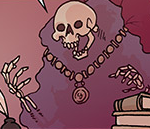|
Riidi WW posted:Yeah and a lot of that is cool and I wish my DM would get to loving work designing all that poo poo, but a problem can arise because the players can only affect the game on the RPG layer, not the strategy layer. So (and not that I'm saying this is bound to happen) it's certainly possible that despite all their roleplaying they might have everything swept under a tide of natural 20s and natural 1s. That's "realistic", for some level of realism, but its kind of a lovely way to roleplay. Bottom line, even with the best "strategy level" system, you still have to be a good GM and keep your players happy. I'll admit (plug your ears players) that there's been a few times I've had to get slightly creative about my interpretations of some rolls in order to keep the players alive, but it's always been a reasonable minor nudge, not world-changing DM-MAGIC. Also, even if the party wipes they can just make new dudes in the same world. It's like dwarf fortress, losing is fun and just adds to the world's lore. They could explore the monster invested ruins of their village years later as different people. Baronjutter fucked around with this message at 19:34 on Aug 11, 2011 |
|
|
|

|
| # ? Jun 11, 2024 04:02 |
|
All that sounds like fun. I've played in games like that and enjoyed them. Games built around economics and politics are fun - who hasn't played Monopoly? What's strange is when people present this as having some relationship with realism. Determining a political result based on a die roll and a table is no more inherently realistic than determining that result based on the GM's judgment.Baronjutter posted:Why don't I just make all that up instead of having stats and systems? The same reason characters like having stats and rules for anything, to feel they are playing a game with an uncertain outcome based on their actions and skills, not just having a pre-written story read to them. And that style of play is great. Though I'd keep in mind that it's not a straight choice between stats and systems and a pre-written story. GM judgments can be made on the spot and create as entirely dynamic a game as something that uses systems. Sometimes even more so, depending on the creativity of the GM and the breadth of the system. You can play a highly dynamic and immersive game set in a consistent, living world without having that world be run by a game system. The advantage of using a game to decide political or economic outcomes is because games are fun, not because they necessarily produce superior results for a particular aesthetic, though with some GMs they may well produce superior results. KakerMix posted:I meant 'relaxed' in implementation. Sometimes the world sucks and it seems (I am just a player after all) that there are realistic reasons for why things happen. Say, the time I almost died because I took two crossbow bolts to the chest. It might have been a random chance or a dice roll or whatever, but as a character it's because I was a little too brazen and simply rushed in (they were the first crossbows we'd encountered. How was I supposed to know?) I'm a fan of this too, I just think there's value in realizing that this sort of style of story - where the hero can die or almost die from a relatively minor threat, where every death isn't necessarily the conclusion of a preplanned story arc - is just that, a style decision, and is a separate consideration from how the division is made between GM and system when it comes to generating story elements. I mean, there are books where major characters die from minor incidents, so clearly this sort of thing can come out of GM judgment alone. There is value, I think, in distinguishing between the advantages of a politics game (games are fun!) and something that can be implemented in a politics game (a seemingly-random threat dramatically changes the story) but isn't an inherent part of that game, or something which requires a game to have.
|
|
|
|
I think some people are under the impression I'm simply sharing how our game is run and played between DMs with diverse backgrounds and styles. This is incorrect. I'm actually laying out the only good way to play any sort of game and if you don't do it how we do it you are wrong and bad and your game is probably unrealistic (the greatest sin in games about dragons and magic poo poo)
|
|
|
|
My point is that if you ask the question "Why don't I just make all that up instead of having stats and systems?" then the part of the answer which is "The same reason characters like having stats and rules for anything, to feel they are playing a game with an uncertain outcome based on their actions and skills," makes sense and the part of the answer which is "not just having a pre-written story read to them" doesn't because using stats and systems is independent of having a pre-written story. One can enforce a pre-written story with a system and one can avoid doing so even without one. So when you present a relationship between the two, you're inherently making a comment about how other people role-play. That may be an unintentional comment, but it's the sort of thing people respond to.
|
|
|
|
Baronjutter posted:I think some people are under the impression I'm simply sharing how our game is run and played between DMs with diverse backgrounds and styles. This is incorrect. I understand that you and your players love the "realistic simulator" style and that's fine. But you even admit that you sometimes give "creative interpretations" to your rolls so as not to slay all the PCs brutally. If you're going to do the ultra-random "I just make the rolls for the world" style GMing, you have to go whole hog or else you're just displacing the blame to the dice when you decide that X happens and it fucks the players up badly. And if you do go whole hog and just roll to determine what happens for everything non-PC, why even be a GM? Why not just be a player and do things Arkham Horror style? Because the way you post about your game, it feels like you're doing your damnedest to remove as much of your own agency from the game as possible. And that just strikes me as arcane because to me, world building and design decisions are the big draws to being a GM. Minimizing those decisions and relegating them to dice rolls on a chart makes as much sense to me as buying a Lego set and then hiring someone to build it for you.
|
|
|
|
You can have very clear and successful rules that guide your GMing decisions without involving dice or numbers. Cf Apocalypse World, which does an amazing job of instructing the GM on techniques that enforce the desired aesthetic.KakerMix posted:This is exactly it. A terrible DM is a terrible DM because they are bad at it, not because of what system they are using. Nah, "system" includes things like this method BaronJutter had to drive events. If the game improves as a result, then that's proof that the system was likewise improved. Absolving the game-as-rules of responsibility for the game-as-experience is one of the classic blunders.
|
|
|
|
Yawgmoth posted:I know you mean this in jest but it still makes you look like as big of a douchebag as your player, who is a douchebag. I love designing worlds and how they run, then watching them come to life partially independent of me. A long time ago I found I had a lot more fun and came up with a lot more internally consistent worlds if I actually started with its economics, and "grew" the world from there. Why program a strategy game when you could just draw cool maps and make up your own histories to get the same end result? Both methods are fun, I just fuckin' love strategy games. I love making them, I love playing them, I love making them and then playing my own game by the rules I made. My current rules are "Here are some stats and formulas for various actors, creatively interpret them to form a narrative" Also some of you guys are really defensive and weird about this topic. We're talking about how we personally like to pretend to be elves or what ever. Anyone sensing I'm telling anyone my way is the best way, or their way is crap, needs to deal with their insecurities, seriously. Most people into traditional D&D style rpg experiences would find my game boring and ponderous and without direction. I've had a couple close friends and long time players from other games get excited when I told them I was running something on irc, then quickly retract their interest after learning there's "resource management" involved. I walk away from every game feeling insecure and worried I just bored my players to death talking about how to buy the cheapest goats and feedstock for an hour, but for some reason we're enjoying this. In case anyone is actually interested how a game like this plays out or looks like, here's our wiki http://www.obsidianportal.com/campaign/q20/ Maps, adventure logs, characters, setting, it's all there. Feel free to judge, criticize, or even just angrily jump to ridiculous conclusions and yell at me. Baronjutter fucked around with this message at 23:36 on Aug 11, 2011 |
|
|
|
I'm a new player to Baronjutter's campaign. I played my first session this week and I have to say it was quite fun. I didn't feel babied or like the game was tailored to fit me in. I had to use my characters skills and abilities to make my own wedge in the story. I think that's good GMing. Anyone can tell a story, but he really challenged me as a player. It wasn't a case of "Here is a new person. Here is a tailored reason for you to need him. You are all now best friends.". He provided the world and the setting, and I used my brain and came up with a reason to be important. I'm still working to earn my parties trust. I think I quite like this style of GMing. The environment feels much larger then it does when I play with other groups who have preset adventures and directions for their party to go. While that system can be enjoyable if run properly, I always feel that there is no depth to the world. In Baronjutters game I feel like there's much more to the world then just what I'm doing and I think that makes him a very good GM. Some of the things many of you have said in response to his campaign have seemed very smug and self important. I feel I can comment on his campaign with little bias. Perhaps we should keep a more open mind here instead of a "he does things differently, he must be a bad GM" mentality. If he was a bad GM I wouldn't have agreed to play again, and I wouldn't be so excited to.
|
|
|
|
Ha, thanks for joining in the conversation q20 players. Your trolling and actual insight is nice to hear. The downside to playing with goons though, goons that know about this sub-forum, is that I can never actually ask for GM advise here without you guys knowing what was coming down the pipes. There's been a few times I wanted to post ideas and get feedback here but I was always paranoid one of you guys would read it, and next thing I know you've avoided the totally unfair random event that kills you and ends the game. Actually I do have a question, and once again guys cover your ears. How do some of you guys handle player death? Not if you have it at all, but when a player is 100% dead for sure, how do you transition in their replacement player. Do you give them the same number of points/levels as their previous character? Make them start from scratch? Base it on a average or lowest party member level? An idea I had to help take the sting out of character death is that every player make a sort of backup character. Meta-game wise they would obviously be a spare in case of death, and in-game they could be an apprentice, a friend, a brother or sister or so on. I'd love to hear anyone else's handling of this sort of situation. Adding in new characters is something I absolutely dread. No matter how well I plan it, I always seem to loose an entire session to the process. I've had games ruined because of players constantly leaving, coming back, leaving so every game seemed to have characters transitioning in or out of the game and me frantically trying to come up with believable reasons why they were going or coming back or what they were doing all this time. Baronjutter fucked around with this message at 23:53 on Aug 11, 2011 |
|
|
|
Yawgmoth posted:I know you mean this in jest but it still makes you look like as big of a douchebag as your player, who is a douchebag. I love you too! Quick, call people names for playing a game that doesn't affect you in any way what-so-ever in a style that you obviously don't like. Then when players who are actually taking part in that system you hate so much say 'Nah it's not bad at all, really!' you can just call us douchebags. Although I am expecting you to throw in 'you guys just don't GET real role playing I don't understand why it has to be all or nothing. The whole point of role-playing is to have fun, right? Maybe have a story you care about, that you have input on, something that was so memorable that you can talk about it to people and they think it's a good movie or something. Something that was such fun you remember events like they actually happened, even though it didn't. Role-playing is literally talking with other people and making poo poo up, with one person being the decider. You can do the diceless system and make poo poo up as you go, go full-on into a specific game type and follow the rules directly to the letter, or like everyone usually does somewhere in between. The hostility to how people play pretend is seriously odd as gently caress though.
|
|
|
|
So I've got a bit of a question. I just started DMing. Literally, my first game was yesterday. It was with a bunch of friends. It was more of a "skirmish", to get the brand new players to see how the game progressed in an actual encounter, rather than making them wait til I got to Barnes and Noble or thought of an adventure. Now I've decided I really like designing encounters, so I think I'm gonna cobble together a mini-campaign while I work on a bigger story. Anyway, that's all besides the point. My group (with myself as a Paladin since we were down one, and otherwise don't have a defender) consists of an Avenger, a Sorcerer, an Ardent, an Assassin, and a Paladin. I brought out a few Kobolds as a lead-up, and ended our night with a young white dragon. Now, they all shocked the hell out of me. They were less interested in gold (they all assumed "Well...if it's THIS MUCH gold, we'd better grab a handful to split, there's probably a parent not far from here), but instead of looking for a magic item, they actually asked if they could salvage bits and pieces as a souvenir! Now, I was QUITE impressed. Literally their first game, and they already improvised items. So I decided to reward their ingenuity with some level 2 Magic items. Trick is, I don't know what's an appropriate magic item for any of us. I'm trying to make them as based on the piece they took as possible (i.e dealing additional cold damage), and since in-character it's THEM getting this stuff designed, I figured they should get something similar to what they want. But I'm afraid all the stuff I gave them might vary in power too much or be too powerful/weak as a whole. As an aside before I post the items: I decided I'd roll this into tomorrows campaign: The man they visited gives them these magical items, but requests a favor to make up for the fact that they're all dead broke. So they aren't getting gold on this next adventure. Here they are: Gloves: When an enemy marked by you takes a move action, you can shift one square when the movement ends as an immediate reaction. Use this power only once between turns (is there an easier way to phrase that?) Light Blade: +1 attack and damage, 1d6 cold on crit, +3 prof. Daily, Free action: Use this power when you poison an enemy. In addition to its' normal effect, the target is slowed (Save ends). Maul: +1 attack and damage, 1d6 on crit, +2 prof. Daily Free Action: After making a successful melee basic following a charge, push the target one square and it is knocked prone. Quarter Staff: +1 attack and damage rolls, 1d6 necrotic on crit Daily, Free action: You may substitute the damage type of an arcane spell with the implement keyword for Necrotic damage (i.e Acid Orb does necrotic instead of acid). Shield: Daily, Standard Action: Close blast 2, Cold +5 vs Ref, 1d8 cold damage and effected creatures are slowed. I tried to give everyone something more fun than a simple glowing dagger. Are these too powerful? Not powerful enough? Are some way more powerful than others? Like I said, this is my first time DMing, and this is my first time making magic items from scratch. I don't want anyone getting stiffed or favored
|
|
|
|
Classtoise posted:Gloves: When an enemy marked by you takes a move action, you can shift one square when the movement ends as an immediate reaction. Use this power only once between turns (is there an easier way to phrase that?) The quarterstaff's power, while flavourful, is also fairly bad in a mechanical sense because dealing necrotic damage is virtually never to a character's advantage – lots of monsters resist it, exceedingly few are vulnerable to it, and off the top of my head I can't think of any feats etc. that key off it. Even if you could change the damage type at will it'd still be pretty much a useless power to have beyond its flavour applications. Consider making it cold damage instead, or really anything that isn't necrotic.
|
|
|
|
Hmm, that's a good point. I hadn't thought of that. Exceedingly useless because I just realized the next leg of their journey (with actual story!) would involve zombies, so I almost inadvertently screwed the poor guy over! How did I not catch that. Classtoise fucked around with this message at 01:02 on Aug 12, 2011 |
|
|
|
KakerMix posted:I love you too! Quick, call people names for playing a game that doesn't affect you in any way what-so-ever in a style that you obviously don't like. Then when players who are actually taking part in that system you hate so much say 'Nah it's not bad at all, really!' you can just call us douchebags. Although I am expecting you to throw in 'you guys just don't GET real role playing He's calling you a douchebag cause you're talking like a smug douchebag, not cause of the game you play. Stop acting like a oval office and we'll stop calling you one.
|
|
|
|
Classtoise posted:Items! Loot! Swag!  Gloves Power (Immediate Reaction * At-Will? Encounter?): Trigger: An enemy marked by you takes a move action. Effect: Shift one square. As a reaction, as mentioned, it's automatically 1/round, and it also automatically happens after the triggering action is completed. Is it supposed to trigger only for adjacent enemies, or could you shift when the guy across the battlefield you just marked with a crossbow shot walks over to his buddy? Either way, it's pretty good for a defender - in fact I'm sure I've seen an item, power or feat that does exactly this. Light Blade Proficiency: +3 Enhancement bonus:[/B] +1 attack and damage Critical: +1d6 cold damage Power (Daily, Free action): Trigger: You hit an enemy with a poison attack using this weapon. Effect: In addition to the attack's normal effect, the target is slowed (Save ends). Seems pretty situational but definitely good for characters who use poison a lot. Gonna skip the basics: Maul: [B](Daily, Free Action): Trigger: You hit with a melee basic attack following a charge. Effect: In addition to the attack's normal effect, you push the target one square and knock it prone. You might want to add "if your attack already pushes the target, using this power pushes it 1 more square" or something. Also I'm pretty sure I've seen an item like this somewhere, too. Quarter Staff's fine as it is, for the shield you might want to clear up whether it targets enemies or creatures in the blast, and how long the slow effect lasts.
|
|
|
|
Classtoise posted:So I've got a bit of a question. I can't comment on the specific powers because I really don't know enough about 4th ed. But you, as the DM, can always, always fix it later if you hosed up. You can be super adversarial about it "The wizard's ice lance negates your firey sword - permanantly!" or more subtle "Your water powers won't help you much in the Desert of Doom!". You can even steal the items from the PCs and let them try to get them back. Or you can just go "we're new to this game and I hosed up and we need to change your burning firey sword to a freezing icy mace". poo poo, I've been playing RPGs for more than 20 years and I / the DM still has to do that poo poo.
|
|
|
|
I greatly prefer the second method, because you should be playing with adults that are mature enough to realize if it's messing up game balance and fun for other people, presumably friends. The player and the GM can then make up an in-story explanation for what happened if the players don't want to just handwave it away, and even give the overpowered item a last hurrah if it's appropriate. The first method just sounds like arbitrariness if you don't get player buy-in first.
|
|
|
|
Yeah, for sure the second method is usually better. But if your players won't wear that and you're playing (and I hate to say it) a more "old school" style of game, either of the first two work pretty well too. I was playing Hackmaster when the GM hosed up and gave me an Axe Of Rapid Whacks (we weren't supposed to kill the original wielder, but Hackmaster...) Then the next couple of session I got to ruin everything with my new toy. Then he started trying to take it off me, and eventually succeeded. That's pure loving Hackmaster though, and you'd get really really resentful players if you did that in a modern style D&D game. You'd be being a dick, too.
|
|
|
|
Haha yeah Hackmaster gets a pass because Hackmaster
|
|
|
|
Baronjutter posted:How do some of you guys handle player death? Not if you have it at all, but when a player is 100% dead for sure, how do you transition in their replacement player. Do you give them the same number of points/levels as their previous character? Make them start from scratch? Base it on a average or lowest party member level? Do not make your players run characters of differing power levels. If someone's character dies, do not assess them a level penalty. If someone new joins, do not make them "earn their bones" or whatever by starting at a lower level. If someone misses a session, do not advance the other characters in experience without advancing them as well. Do not do it. Making one player less able to contribute meaningfully to the game is stupid, lovely, and unfun. Don't be stupid and lovely  quote:An idea I had to help take the sting out of character death is that every player make a sort of backup character. Meta-game wise they would obviously be a spare in case of death, and in-game they could be an apprentice, a friend, a brother or sister or so on. In the campaign I'm playing in right now, our wizard (who had a bit of a tragic plot arc) died and turned into an astral construct of himself, which summoned his apprentice to help us. The apprentice was the same level as his old master because 1) he was naturally gifted and his master was kind of a layabout slacker, and 2) the apprentice stole a dangerous magical artifact from his NEW master when his old master asked him to come help us. This has had some fun RP moments associated with it.
|
|
|
|
Riidi WW posted:
(Mechanically this was represented as a human wizard turning into a stormsoul genasi wizard for one dungeon, and then transitioning into a NEW human wizard)
|
|
|
|
Hackmaster (yeah, again) has a complicated mentor/protege system. While it's way too mathsy to use for D&D, the basic concept works fine. Your character has an apprentice, friend, sibling, or ward who you "activate" should your main character die. In D&D I definitely wouldn't have them be even a single level below the main character. It can be quite cool for the story side of the game, where Sven has been waiting patiently outside the dungeon, holding the horses, and the party comes back out... and Sven asks "Where's Olaf? Is he bringing up the rear?" "Well, not exactly..."
|
|
|
|
Riidi WW posted:Do not make your players run characters of differing power levels. If someone's character dies, do not assess them a level penalty. If someone new joins, do not make them "earn their bones" or whatever by starting at a lower level. If someone misses a session, do not advance the other characters in experience without advancing them as well. I always set a base amount of experience for each session that everyone gets whether or not they can be there that evening. I still do, however, reward a bit of extra experience for good roleplaying and great ideas for those who ARE present. It is never enough to seriously break the average power level or anything. The goal is not to PUNISH the player who misses a session, but to reward people who do great stuff while they're actually present. Sometimes I even just ask the guy who missed a session to write up a few paragraphs explaining what their character was up to in the meantime, and that can be worth that bit of extra experience if it is entertaining or interesting.
|
|
|
|
Rocket Ace posted:I always set a base amount of experience for each session that everyone gets whether or not they can be there that evening. Arguably the best way to do it, in my opinion. I think bonus experience from a baseline is a good way to do it. Players then have an impetus to rise above the norm. They know they can't exactly fall behind, but in a way they can if they are lazy and their fellow players are not!
|
|
|
|
Rocket Ace posted:I always set a base amount of experience for each session that everyone gets whether or not they can be there that evening. For a system like D&D, this is still a bad idea. It would be better to give RP-specific awards, like prestige or status within the game world, or wondrous items or boons. I don't really have a problem with giving bonus XP in systems like WoD or GURPS (though I still personally wouldn't do it), but the challenge math in D&D really goes haywire if you have players of differing levels.
|
|
|
|
Old School Hack does it best. Player experience is gained by spending x number of points to increase odds, hit harder, etc. The points are given to you when other players think you've done something awesome from a pool that only fills as the GM spend points to fudge dice. And you only level when the entire party has spent enough points... so everyone at the same time. It's quite elegant.
|
|
|
|
Thanks for all the advice. Definitely going to look over my items and make them clearer/better/more balanced (might change the eye into a "change its' type to psychic/cold/psychic OR cold), and if all else fails I'll definitely man up and admit I screwed up and ask if I can change it.
|
|
|
|
Crazy, I've rarely played a a D&D with communal exp before, everyone had their own exp based on not just the number of games they showed up for, but what they did in each game. When you'd die you'd lose any exp beyond the base level you were on when you died. It seemed to work pretty well an encouraged people to show up and actually role play, and not just kill their guy any time they wanted to re-roll or min-max a little differently. We'd generally have a 2-4 level spread of characters levels near the end, and maybe 1-2 level difference at lower levels. The DM would often hand out bonus exp during or even after games for doing things. I got a couple hundred for making a cute lego model of something game related while we played, stupid poo poo like that. It definitely motivated me to be a good player so I could catch up to the higher level established characters. In the game I played with communal exp, people seemed to min-max and twink out a lot more for what ever reason. I guess with everyone having the exact same exp no matter what they did, the only way to differentiate them selves was through ridiculous broken prestige classes they found in awful official books. That and we had a couple guys who would purposefully get their characters killed every time they read about some new totally broken character build they wanted to try. And with fairly low treasure levels, dying often meant you started with about double the GP value in stuff from dying. lovely!
|
|
|
|
What my group does to negate all of the fiddly number-touching of XP is we all just level up at a dramatically appropriate moment (this is causing some headaches for our GM because we ran away from the paragon boss so now he's trying to find a new dramatic thing for our paragon gateway fight) If a player is missing their punishment is that they had to miss a fun session of RP and somebody else got to play their character in the fight. Powww.
|
|
|
|
Amidiri posted:What my group does to negate all of the fiddly number-touching of XP is we all just level up at a dramatically appropriate moment I basically switched over to this a couple years back for everything except 2E D&D and Hackmaster (where it would actually create a hugely unfair advantage for some classes).
|
|
|
|
Heh, when I was a DM running a 3.5 game I did the same, I just didn't tell anyone. "I'll be handling your exp guys" is all I said. Then I just handled out levels when it felt right.
|
|
|
|
Baronjutter posted:I guess with everyone having the exact same exp no matter what they did, the only way to differentiate them selves was through ridiculous broken prestige classes they found in awful official books. Yeah this sounds like lovely players, not necessarily a knock against communal xp. Mostly because in what version of dnd are xp and powering the only mechanical, controllable ways to distinguish a pc from others?
|
|
|
|
Chainsawdomy posted:I basically switched over to this a couple years back for everything except 2E D&D and Hackmaster (where it would actually create a hugely unfair advantage for some classes). Oh god, can you imagine the thief getting stuck with being the same level as the wizard or barbarian... basically his only advantage is "levels up real fast". Not to mention that it's completely against the spirit of Hackmaster. But yeah, for most games all the players really need to know is "you guys levelled up, pick your new skills and stuff".
|
|
|
|
Also it would be different if you could level during a session without killing the pace, but D&D just doesn't work that way.
|
|
|
|
I'm trying something new (at least to me) in the game I'm running now for the first time. We've been through 3 systems so far, and every time things get simplified. 3.5 to a Dark-Hersey style system to a white wolf style system to the current simple "descriptive system" There's no skill list, no points, no exp. Every player just sort of tells me the sort of character they'd like the play, then I work with them to translate that into a character. All a character is is a short list of things that define them. Skilled Swordfighter, +2 to swords Decent Cook, Can reliably prepare above-average meals Skilled Carpenter, +1 to carpentry Keen Ears, +1 to listen checks Hates Elves, has trouble hiding hatred of elves Just a handful of descriptors like that, and bam, character is done. It's been working great and lets us focus on the game rather than the system. One character might have a sneaking skill, another might have a "thief" skill that includes sneaking and many others. There's no consistency as there's no need for it. We don't even attempt to balance characters or skills, and advancement is handled though simply increasing player's skills they use a lot or specifically train in (getting exponentially harder as they go up)
|
|
|
|
Baronjutter posted:I'm trying something new (at least to me) in the game I'm running now for the first time. We've been through 3 systems so far, and every time things get simplified. 3.5 to a Dark-Hersey style system to a white wolf style system to the current simple "descriptive system" I think you might want to take a look at Legends of Anglerre.
|
|
|
|
Glazius posted:I think you might want to take a look at Legends of Anglerre. Seconding this HARD, or if you want a little lighter rules PDQ.
|
|
|
|
AlphaDog posted:... basically his only advantage is "levels up real fast". Which incidentally, I've always kind of liked. To me it gives a thief the feeling of being a scrappy opportunist; sure he can't take many more sword blows at 5th level than he can at first, but since the rest of the party is still 2nd-3rd, his skills and saving throws are all higher, so he gets to be the problem-solver/survivalist. On that note, (since we're seemingly the only two forum-members who actually run HM on anything approaching a regular basis) do you actually use the training-to-level-up rules as-written? It's one of the things I almost always waive, because it's poison to any sort of ongoing story, and if I have to hand out money for training, it makes it harder to manage the player resources (You can never be sure someone's not going to eschew leveling and just hire 200 men-at-arms instead.
|
|
|
|
Glazius posted:I think you might want to take a look at Legends of Anglerre. Is legends of anglerre in the FATE system?
|
|
|
|

|
| # ? Jun 11, 2024 04:02 |
|
Riidi WW posted:Is legends of anglerre in the FATE system? Yes, it's by the same people who did Starblazer.
|
|
|


































